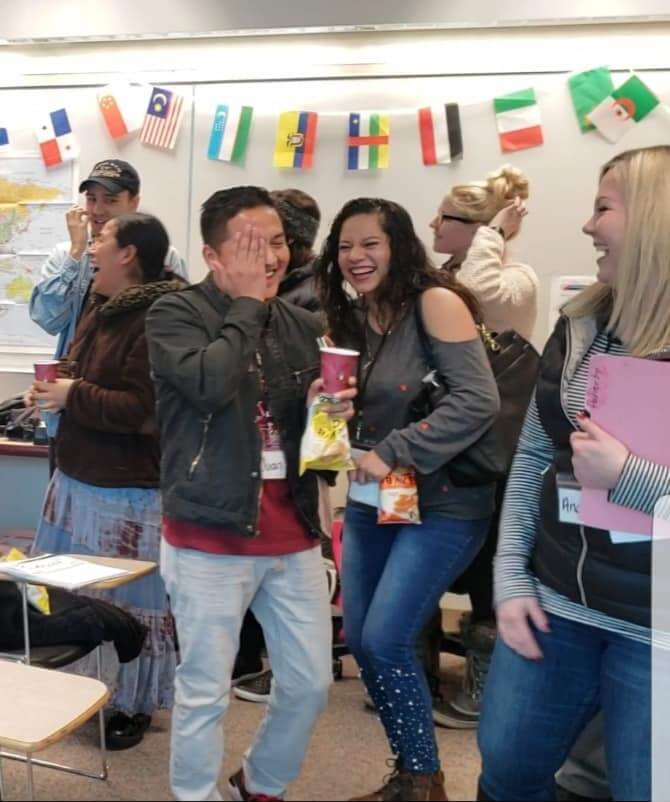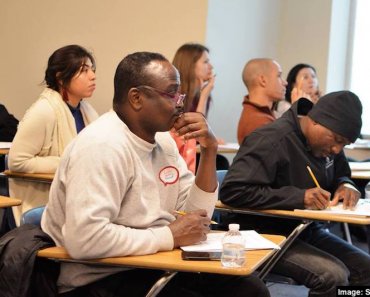Every Saturday, in a small classroom at Gonzaga University, a group of graduate students is building a community that unites students with immigrants and refugees.
Established in 2012, Gonzaga ESL Community Outreach (GECO) is a community-based program that provides free English as a Second Language (ESL) classes weekly to immigrant and refugee adults in Spokane, Washington.
Initially started to give more teaching experiences to graduate students in Teaching English to Speakers of Other Language (MA/TESOL) program, GECO has grown exponentially. Now, GECO has 3-6 graduate students teaching classes per week, a paid coordinator, multiple-level classes and pre-K ESL program that teaches children of immigrant families.
GECO students come from more than 20 other countries, including Belarus, Chile, Ghana, Haiti, India, Kazakhstan, Peru, Taiwan, Uruguay, Ethiopia, Marshall Islands, Russia, Saudi Arabia, Sudan, Syria, Ukraine, Venezuela, Vietnam, Afghanistan, Mexico and Brazil.
“I want to tell them they are wanted and have every right to be successful here,” a GECO teacher said in a statement.

How they get involved
According to James Hunter, a director of the MA/TESOL program, graduate students usually find out about GECO through the university website, graduate student orientation and word-of-mouth. They can participate from their first semester through graduation.
“They learn a great deal about the program, administration responsibilities, and the local immigrant and refugee population,” said Hunter.
More experienced graduate students can use GECO to mentor undergraduates who are interested in the MA/TESOL program.
“This mentorship model is a net gain for everyone, since the GECO students have more teachers to assist them, and the teachers have a collaborative team to support them,” said Hunter.
Similarly, GECO students learn about GECO through flyers posted in grocery stores, foreign food marts and libraries and social media. For example, GECO has a Facebook group to post updates and communicate with students.
According to Hunter, GECO also networks with local nonprofits, businesses and community organizations to market the program to much wider audience.
More than a class
GECO offers three types of classes for different levels. Class A is for beginners, and teaches English for basic living and survival. Class B is for intermediates, and teaches English for daily living and work. Class C is for advanced students, and is about daily living, work and introduction to academic.
GECO has also recently added an interpreter training course for advanced students.
GECO has become a learning opportunity for both teachers and students. As teachers practice teaching English, students teach them about different cultures and life stories.
For example, after her time at GECO, Sarah Griffith, the GECO coordinator from 2017 to 2018, realized her passion for immigrant and refugee education. Now, she plans to use her experience from GECO as she works on an adult ESL program for over 300 adult residents of the Oinofyta Refugee Camp in Dilesi, Greece.
Moreover, GECO has become not only a learning opportunity, but also a stepping stone for immigrants to develop professionally.
For example, in spring 2018, eight GECO students and two GECO teachers — both MA/TESOL students — participated as speakers on a panel at Gonzaga University’s Student Research Leadership symposium. They shared stories about how they are leaders in their new-found communities in the United States and how learning English propels them to make changes for their communities.
Along with teaching English and growing a community, GECO provides a safe place for students to share their thoughts on immigration in U.S. politics. While challenges of immigration policies do exist, GECO focuses on the care of immigrants and refugees already living in the local community.

GECO in your community
According to Hunter, GECO can exist in all kinds of different forms and degrees in every campus.
If a university has a program similar to GECO, you can take the time to join and have personal conversations with immigrants and refugees living around your school. If not, you can bring some friends together and start an outreach program to meet the needs of immigrants and refugees, such as language classes, in your school or community.
Or, at the very least, if a local community hosts cultural events, you can attend and show an interest in learning about a different culture.
“Many of our GECO students expressed a desire to want to feel welcomed in the local community and showing an interest in their culture is a great start,” said Hunter.



